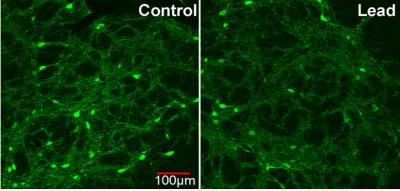
Rats exposed to lead had a lower cell density of parvalbumin-positive neurons compared with controls. A study of the brains of rats exposed to lead has uncovered striking similarities with what is known about the brains of human schizophrenia patients, adding compelling evidence that lead is a factor in the onset of schizophrenia.
Results of the study by scientists at Columbia University's Mailman School of Public Health appear in the journal Translational Psychiatry.
The researchers found that lead had a detrimental effect on cells in three brain areas implicated in schizophrenia: the medial prefrontal cortex, the hippocampus, and the striatum of rats exposed to lead before birth and in the early part of their lives. Density of brain cells known as Parvalbumin-Positive GABAergic interneurons, or PVGI, declined by approximately a third--at roughly the same percentage decline seen in schizophrenia patients. And, using imaging technology, they identified higher levels of a dopamine receptor called D2R. Again, the magnitude of the increase matched what has been documented in human schizophrenia patients, and in a previous study of genetically engineered mice.
"The similarities in the brain structure and neuronal systems between what we see in lead-exposed rats and human schizophrenia patients are striking, and adds to a growing body of literature suggesting that early lead exposure primes the brain for schizophrenia later in life," says senior author Tomás Guilarte, PhD, chair of Environmental Health Sciences at the Mailman School.
Cocaine Insights
In a related finding, the researchers found that rats exposed to lead had a much stronger reaction to cocaine than healthy rat controls. In the experiment, lead-exposed rats that were injected with cocaine ran around in their cages at twice the distance of lead-free control rats. The rat behavior is meaningful because it mirrors what is seen in schizophrenia patients, who are known to have a heightened response to the drug.
Schizophrenia is not the only possible consequence of lead exposure. A follow-up experiment will allow the rats to self-administer cocaine in order to test whether lead exposure plays a role in addiction.
"We are currently assessing the impact of lead exposure on both the rewarding and reinforcing properties of addictive drugs like cocaine while exploring the biological underpinnings of how lead exposure plays a role in addiction," says first author Kirstie Stansfield, PhD, associate research scientist at the Mailman School.
Source: Columbia University's Mailman School of Public Health
 Print Article
Print Article Mail to a Friend
Mail to a Friend
